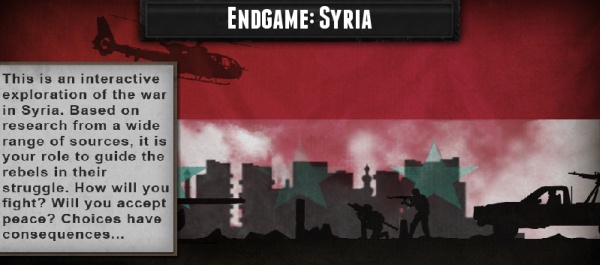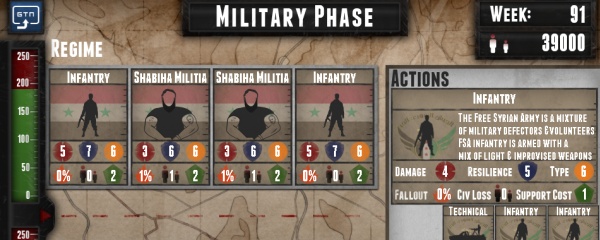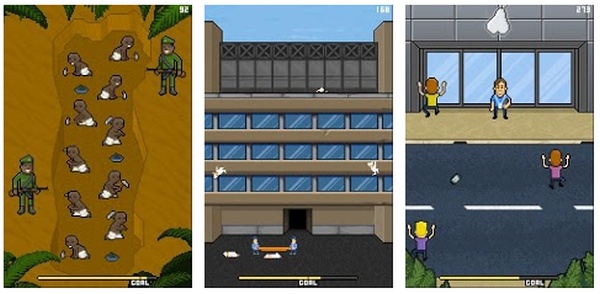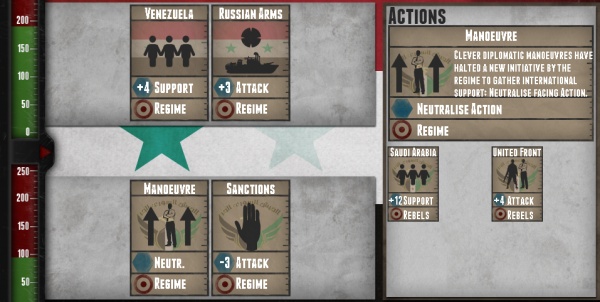By RPS on February 13th, 2013 at 5:00 pm.

Where once games had their focus in historical conflicts, more frequently we see contemporary matters appearing in the medium. While mainstream games have touched on ongoing wars, indie games have taken this a step further, asking more complicated, political questions of gamers, to mixed responses. William Drew investigates this current trend, the backlash against it, and speaks to the developers behind the games.
When the App Store turned down Auroch Digital?s Endgame Syria (still playable on PC), the news stories highlighted the question at the heart of the Game The News project from which it emerged. The idea behind the Syrian civil war strategy game was for the developers to become the ?first news correspondents who cover global events as games.? But the App Store?s guidelines stated that an app cannot ?solely target a specific race, culture, a real government, corporation or any other real entity.? There was no suggestion that Endgame Syria trivialised the conflict: it was the very fact of representation that seemed to be the problem.
Games aren?t just about representation. Within an interactive medium, the player adopts a position, plays as someone: in Endgame Syria, you play as the Rebels and you have no option to play as the regime. Yet the game fell foul of this ultra-contemporary idea.
?I think that pressure comes in part from how people think news should be, offering both sides of the story and being impartial,? explains Auroch Digital?s Tomas Rawlings. ?However news is not impartial nor does it always offer both sides of the story. Games have come unstuck offering ?both sides? (think of the Medal of Honor Taliban story) in real world events and I think there would be another group of critics who would say we were wrong to do that, if we had offered both sides. The best you can do is follow what you feel is going to work, fact check that, then be confident in what you have done.?

He also points out that the decision to allow players to explore the conflict from one side only wasn?t necessarily a political one. It was also an aesthetic and practical one he had to make as a designer. ?It was a decision about what I felt the game should focus on,? Rawlings continues. ?If I did make a game where the player could play the Assad regime, then you?d need to be able to select the way the politics and military campaigns would be conducted as the game we?ve made does. That would involve choosing not to, for example, bomb cities if that is how the player wanted to go. But we have no plans to implement that currently.?
As Rawlings observes with the example of the Medal of Honor Taliban multiplayer option, which caused controversy a couple of years ago, representing both sides doesn?t necessarily save developers from censure. 1378(km) caused huge controversy in Germany because it allowed you to play as either an East German border guard or as a refugee trying to escape the Deutsche Demokratische Republik. It was created as a student project by young German designer Jens Stober and based on Frontiers, a Half-Life 2 mod featuring a migrant?s journey from Africa to Europe. Stober explains that the controversy erupted before the game was even available to download. ?All the discussions were formed out of sometimes very imaginative press reports. The biggest newspaper in the EU (BILD) called it ?revolting?. (?Will the revolting East German shoot-?em-up be banned??). You have to know that the BILD is the German yellow [tabloid] press. They also described in the article that you will have to hunt as many refugees as you can and shoot them to beat the high score and win the game. But this is bullshit. The quintessence of 1378(km) is: If you shoot, you will lose the game!
Unlike Game the News, Stober?s motivations were less about covering current events and more about exploring a sensitive issue that he felt hadn?t been well covered by the German educational system when he was growing up. ?You have to imagine that you got the order to stop people fleeing from Germany to Germany,? says Stober. ?There was an order to shoot at your own people. Because this issue was not covered pretty good in school it was my aim to address it to a young generation by using their medium ? computer games.?

While games can allow players to engage with current events, and with difficult aspects of their own national history, they can also engage with the world around us in a more radical, subversive way, making us consider the moral and political implications of even the goods we use to play them on. Molleindustria?s Phone Story was initially accepted onto the App Store before being removed after few hours, when Apple realized what it was targeting: smartphone manufacturing itself. The game begins with a big green smiley face saying, ?Let me tell you the story of this phone, while I provide you with quality entertainment.? When you die in the game it tells you, ?Don?t pretend you are not complicit.?
Paolo Pedercini of Molleindustria freely admits his intention to cause trouble, but it?s trouble driven by strong political convictions. ?Phone Story was in part a media intervention, it was about sneaking an ugly gnome inside Apple?s walled garden. Because the production of meaning doesn?t only happen on the screen, from the interaction between players and software/rules. The context a game inhabits, the community it creates, the platforms and technologies it adopts, all these things are also part of what a game ?says?.?
He is unsurprised by the App Store?s decision to turn down Endgame Syria. ?[The decision] is not surprising,? says the developer. ?There is now a long list of apps that have been turned down simply for touching upon political issues. After the ban of Phone Story people were asking me whether I intended to modify the game to make it less ?questionable?. Maybe removing the enslaved children or the suicidal workers, or using more subtle metaphors. I responded that I didn?t think the problem was really the graphic representations as Apple stated, but the very intent of the game. Then a few months ago this other iOS game called In a Permanent Save State came out, and it was doing exactly that: tackling similar issues in an allegoric, tasteful and lyrical way. It was turned down.?
But why? What is Apple?s problem with an app expressing a viewpoint that they might not censor in a song or book they might publish. ?Apple is very clear about their views regarding the cultural status of the ?App?,? says Pedercini. ?For them, games and applications are not part of culture like books or music. In their guidelines they say, ?If you want to criticize a religion, write a book. If you want to describe sex, write a book or a song, or create a medical app.? For them, apps are not culture, they are more like screwdrivers or toys.?
Pedercini sees Apple?s decision to turn down Endgame Syria, In A Permanent Save State and Phone Story as political acts motivated by a particular ideology. ?The rise of personal computers and decentralized networks allowed us to decide what kind of information we wanted to consume, and made [it] dramatically easier for everybody to produce and distribute their own culture. I believe this has been a huge step toward a more democratic society. The post-PC future aggressively pushed by Apple and other corporations, this future of tablets, consoles and various locked-down, lobotomized computers is an attempt to reverse this trend. Of course, Apple doesn?t want it because they are simply looking for profits, and it make sense to transform these powerful and flexible tools into tightly controlled terminals for consumption.?
Pedercini?s argument suggests the in refusing to allow space for political discourse, the desire is to restrict the position of games in a culture. That?s certainly the response of a lot of mainstream media to both apps and PC games. However, in counterpoint to this, Jonathan Blow recently wrote an opposing position on his blog.
?I think this is the wrong attitude about games, but look, ultimately it is game developers? fault, not Apple?s. Apple is treating games as shallow commercial entertainment experiences because they have been taught by game developers that that is what games are. If we had built a world where games routinely work with serious issues in ways that people care about, Apple would not be able to take this stance, because it would not make any sense.
Why do they say, ?If you want to criticize a religion, write a book?? It?s because it?s obvious that banning books is bad, because there have been a lot of books that people find important (and we have had many cultural cycles involving people attempting to ban books, and culture has worked out ultimately that this is not a good thing). Games do not have this history. Right now Apple thinks a game is Angry Birds or maybe Infinity Blade. So who can blame them?
Apple may be badgered enough to change their policy someday, or they may not. But that doesn?t matter very much because really it is just a reflection of the general cultural idea about what games are. The only way that idea will change is if a lot of developers make a lot of serious/deep/honest/touching/intrepid games for a long time. I don?t know if that will ever happen. How many games can you think of to which you can seriously apply these adjectives? [...] So, game developers are just sort of reaping what they have sown. What else would you expect??

He goes on to describe Endgame Syria, which he hasn?t played, as a ?step in the right direction,? but, ?to change these attitudes we need lots of steps, consistently, not just a token step now and again.?
Pedercini also feels that there are a handful of titles every year that try to reflect the outside world in their games, but says that he doesn?t know if there is a growing trend.
The Game the News project is an important one for exactly this reason. With each game in what is intended to be a year-long project, it is asking a question about the position of games in our culture today. Rawlings says he hopes that, ?Gamethenews.net shows that gamers do care about the real world so developers should not shy away from referring to it.? Could this be the movement Blow says is necessary to change the minds of publishers and media?
Source: http://www.rockpapershotgun.com/2013/02/13/playing-politics-the-backlash-against-topical-gaming/
Red Bull Stratos Redbull Stratos steve mcnair vice presidential debate Martha Raddatz Chris Lighty JJ Watt
No comments:
Post a Comment
Note: Only a member of this blog may post a comment.